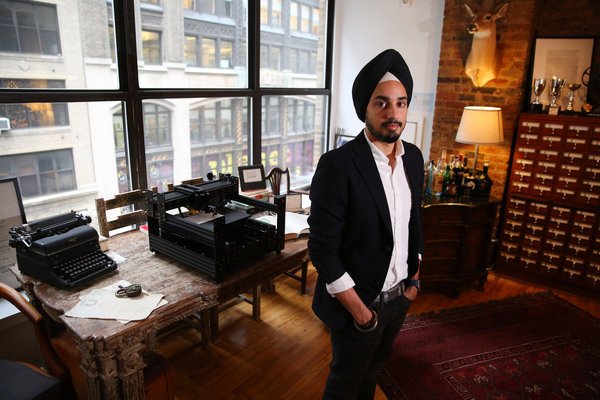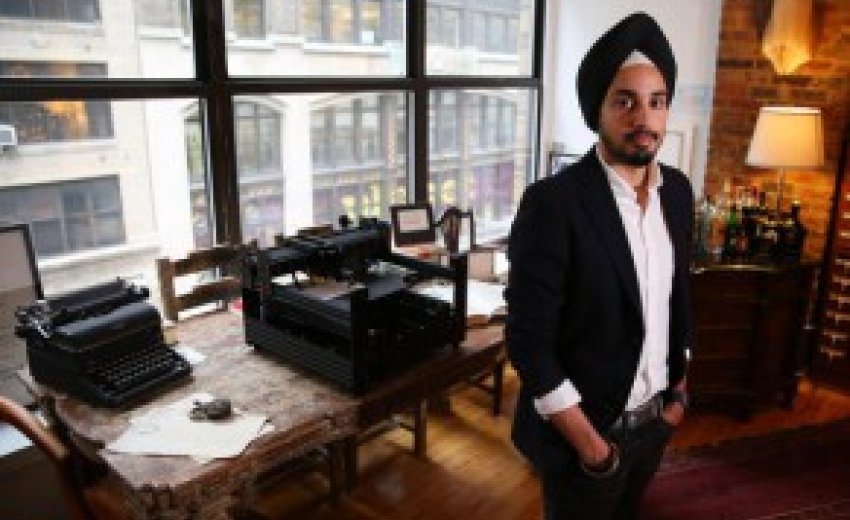 |
| Sonny Caberwal, chief executive of Bond. Directly behind him is a writing machine the company designed to produce personalized notes. Chang W. Lee / The New York Times |
December 16, 2015: Communication today is faster and more ephemeral than ever. We fire off emails, skip the punctuation in our texts, and watch our photos and messages vanish in seconds on Snapchat.
Digital tools have made communicating with others easier but not necessarily more thoughtful, and this bothered Sonny Caberwal, an entrepreneur. “We’re in a rush to make everything disappear,” he said.
Receiving a physical, handwritten thank-you note or letter these days feels special, but it also requires some work. “You have to assemble all the pieces,” Mr. Caberwal said — including paper, a pen, the recipient’s address, an envelope and a stamp — and then the note has to be written and mailed, all of which is time-consuming. He wanted to enable people to do that more easily, by harnessing technology to create a product that still felt very personal and worth keeping.
His company, Bond, harks back to a time of fountain pens, creamy sheets of writing paper and wax-sealed envelopes. Mr. Caberwal, founder and chief executive of the New York City start-up, describes it as “the opposite of Snapchat.” Bond was started in 2013, and has about 50 full-time employees and several high-profile backers, like Gary D. Cohn, the president of Goldman Sachs, and the rapper Nasir Jones (known as Nas).
Although handwritten notes and cards may seem like artifacts of the 20th century, greeting cards are still a strong business. According to the Greeting Card Association, Americans purchase about 6.5 billion cards a year and annual sales are estimated to be $7 billion to $8 billion. Despite a culture awash in digital communications, the greeting card and stationery industries have not declined precipitously but have remained largely flat, said Patti Stracher, director of the National Stationery Show, an annual trade show and business event for stationery, greeting card and gift companies.
“One could say the digital age has grown connectivity and expanded the reasons for other forms of personal communication, for a tangible, experiential connection,” she said.
At the Greeting Card Association’s annual convention in October, nearly every presentation included a discussion of the intersection of digital technology and traditional greeting cards, said Carlos LLansó, the organization’s president. “We’re actually finding that social media gives people another opportunity to identify card-worthy occasions,” he said. “You can’t save a Facebook birthday message and put it in a drawer.”
That overlap of digital and traditional is where Bond lives. The company built its own writing machine, which can produce personalized notes for every customer. Designed by the company’s chief technology officer, Kenji Larsen, the machines have robotic arms that can hold a pen, a paintbrush or a marker. The paper is moved around using static electricity — rather than a roller — so it stays pristine, with no wrinkles or marks. Bond also seals each envelope with wax, adds postage and mails it.
Customers can choose from a variety of handwriting styles, or they can have their own handwriting copied and digitized for $500. Each customer’s original signature is uploaded to Bond via smartphone, to be used on cards and notes. Customers also upload recipients’ addresses. If an address is unknown, the service will send an email or text message to the recipient asking for it. An invitation-only premium service, Bond Black, costs $1,200 a year and provides clients with a personalized mobile app to send notes in their own handwriting on custom stationery.
Many of Bond’s biggest customers are commercial, including Fortune 500 companies, nonprofits, and small independent businesses like professional services firms and real estate brokers.
“Companies spend $23 billion on customer relationship management tools to understand and have a more personal relationship with their customers. We are the physical implementation of that,” Mr. Caberwal said.
One Bond client, a Fortune 500 retailer, tested the service by sending personalized thank-you notes to some of its best customers. Those customers, Mr. Caberwal said, ended up spending, on average, $16 more each month after receiving the thank-you note and returned 33 percent less merchandise.
Mr. Caberwal followed an unusual path on his way to starting Bond. He was a corporate lawyer, played percussion with the band Thievery Corporation, founded a tea store, modeled for Kenneth Cole and, with his wife, started the online fashion company Exclusively.com in India. That company was acquired by the Indian e-commerce marketplace Flipkart. By that time he, his wife and their young daughter were back in New York, and Mr. Caberwal was looking to start another company. “That’s really what I know how to do best,” he said, “build e-commerce companies.”
Bond now has 200 robotic writing machines in its Manhattan facilities (although the machines are manufactured at a plant it owns in Rhinebeck, N.Y.), and it also produces its own stationery. The company raised “a few million” in seed funding, Mr. Caberwal said, and is in the midst of an effort to raise $3 million. By the end of the year, Bond expects to have about $500,000 a month in sales, he said, adding that revenue has been growing from 30 to 50 percent a month. Mr. Caberwal said he expected Bond to be profitable by the second quarter of 2016. A single card costs $3.50, but for corporate customers with larger orders, the price ranges from $2 to $2.50 a card.
Jason Hirschhorn, founder and chief executive of the New York start-up Redef, which provides curated information streams, began using Bond’s services this summer. “They are using robotics in a very clever way,” Mr. Hirschhorn said. “I don’t have a lot of time, but I like the idea of being able to use personalized stationery in my own hand, using my own words, all done remotely for me. And it’s all in my computer, so I can track what I’ve done.”
Saneel Radia, founder and president of Finch15, a New York firm that helps companies develop new products and services, uses Bond’s service early in his relationships with customers and business partners. At first Mr. Radia had his own handwriting duplicated but then switched to one of the styles offered by Bond.
“I hate what my handwriting looks like, so I upgraded it,” he said. “Now it’s an odd mix of creative and energetic, handwriting I wish I had.”
Mr. Radia said people often thanked him for the notes they received, and he readily admitted that a robot had written them. “People hire us because we are at the intersection of service and technology,” he said. “Bond, like us, is also at that intersection, so using the service shows that our company has its finger on the pulse of what is new and useful in this space.”
Mr. Radia said although the cards created by Bond are not actually handwritten, they are still a far cry from an email or a mass-produced thank-you note.
“You’re giving someone something that took time and is work — not the same amount of work as mailing a letter you wrote yourself, but more than a text message that says, ‘Thanks for the meeting,’” Mr. Radia said. “It’s thoughtful, and it is my sentiments. And it comes in an envelope with a wax seal, which certainly helps.”
---------------------------
Related Article:
Sikh Entrepreneur Brings Personal Touch to Tech
